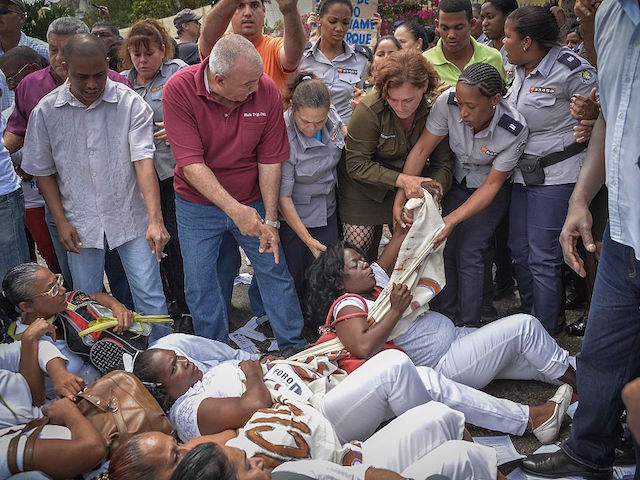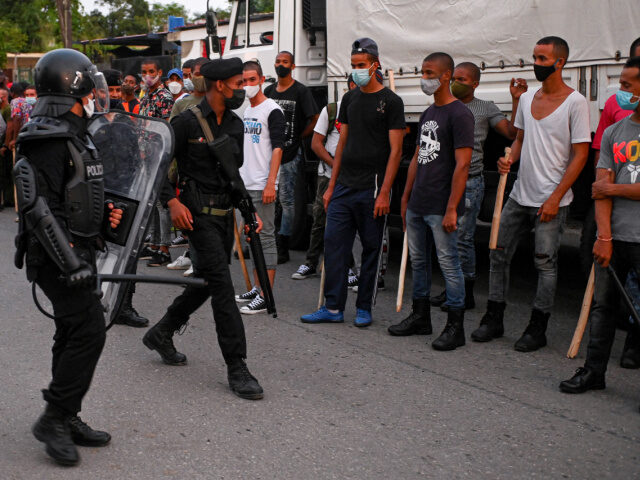Anti-communist women imprisoned for their beliefs in Cuba told the Spain-based Diario de Cuba publication that the state systematically uses sexual assault, including hours-long gang rapes, to torture dissidents in its prisons.
The women who spoke to the outlet, some of whom requested to remain anonymous, described their experiences at a notorious Havana prison known as 100 y Aldabó, where the regime has, against its own laws, imprisoned minors in the past. One such detained suspected dissident, a then-17-year-old named Gabriela Zequeira Hernández, described guards sexually assaulting her and threatening her with rape shortly after her arrest during the July 11, 2021, anti-communist protests.
The human rights organization Prisoners Defenders, which tracks politically motivated arrests on the island, released a report on Thursday confirming at least 1,048 people in Cuba sentenced to prison for their political beliefs. Those thousand are only the people whom Prisoners Defenders confirmed were in prison and were formally sentenced to incarceration for political crimes, such as “social dangerousness” and “disrespect”; the organization warned that the true number of political prisoners on the island is almost definitely far higher. The number also does not include political prisoners recently freed.
Still more people, including some of Cuba’s most prominent dissident leaders, do not figure into official political prisoner statistics because the regime, in an attempt to manipulate its human rights record, does not charge them with anything and arrests them repeatedly only to free them and arrest them again shortly thereafter. The leader of the Ladies in White dissident group, Berta Soler, for example, faces arrests, torture, and beatings on a near-weekly basis without being charged with any crime.

Members of dissident group “Ladies in White,” wives of former political prisoners, protest on March 20, 2016, in Havana (ADALBERTO ROQUE/AFP/Getty Images).
Yeilis Torres Cruz, a former political prisoner detained for eight months after a dispute with a local Party member in May 2021, who now resides in the United States, told Diario de Cuba on Tuesday that she endured multiple rapes at the hands of several men at 100 y Aldabó during her imprisonment.
“They did it multiple times and I am sure that many of the girls from July 11 that went through there suffered the same thing, because that was one of the first attacks they committed against us,” she called. Torres said state workers at the prison referred to her rapists as Manguera and Mandarria, “Hose” and “Sledgehammer.”
Diario de Cuba recalled the testimony Zequeira gave shortly after her release from the prison in 2021. Zequeira was not a protester, she insisted at the time, but had left a hair salon when a burgeoning protest emerged on the Havana street that she happened to be on. Authorities arrested her along with everyone else present in public to subdue the displaces of opposition to the regime:
“One of the most unpleasant moments I had … they came into my cell and said they were going to get a guy named ‘Hose’ and a guy named ‘Sledgehammer’ and take me out to the ‘pavilion,’” Zequeira told the independent outlet Cubanet while under house arrest at the time. “That ‘Hose’ was a mulatto guy, strong, with a not that big … thing but more or less. And Sledgehammer was a black man, strong, very big, who did have it big. He told me laughing.”
“They just explained to me now that I got out that ‘pavilion’ is to go have sexual relations,” she said. Zequeira was 17 when this happened; she recalled repeatedly telling the guards that she was a minor only to be mocked or ignored.
In her testimony to Diario de Cuba this week, Torres recalled that, in addition to enduring rapes that sometimes lasted as long as three hours, guards at the prison would show her images of her daughter and other family members as a form of psychological torture, threatening to harm them if she did not comply with guard orders.
Another witness, who wished to remain anonymous, told Diario de Cuba that she also experienced hours-long, brutal rape at 100 y Aldabó. After five days at the prison, she said, “an official came to get me to move me to another cell.”
“They left me alone there about half an hour until an official opened the door and they stuck two men in there who raped me for two hours straight. They told me that that’s what I got for being so rebellious and not wanting to do political activities.”
Survivors of 100 y Aldabó have for years denounced it as one of the most brutal penal institutions in Cuba, the place where communist authorities send the most obstinate political opponents to “break” them. But Cuba is home to many such institutions nationwide used to torture and suppress anyone who dares publicly express dissatisfaction with over half a century of communist rule.
Prisoners Defenders’ May report noted that the thousand confirmed political prisoners are spread nationwide and emphasized that “without a doubt, all political prisoners in Cuba are tortured.” Among these, 35 of those identified are children: four girls and 31 boys. Most children, with the exception of some in their later teens, are forced into juvenile centers known as “Integral Formation Schools” rather than torture centers such as 100 y Aldabo, though human rights groups have documented exceptions.
Follow Frances Martel on Facebook and Twitter.

COMMENTS
Please let us know if you're having issues with commenting.